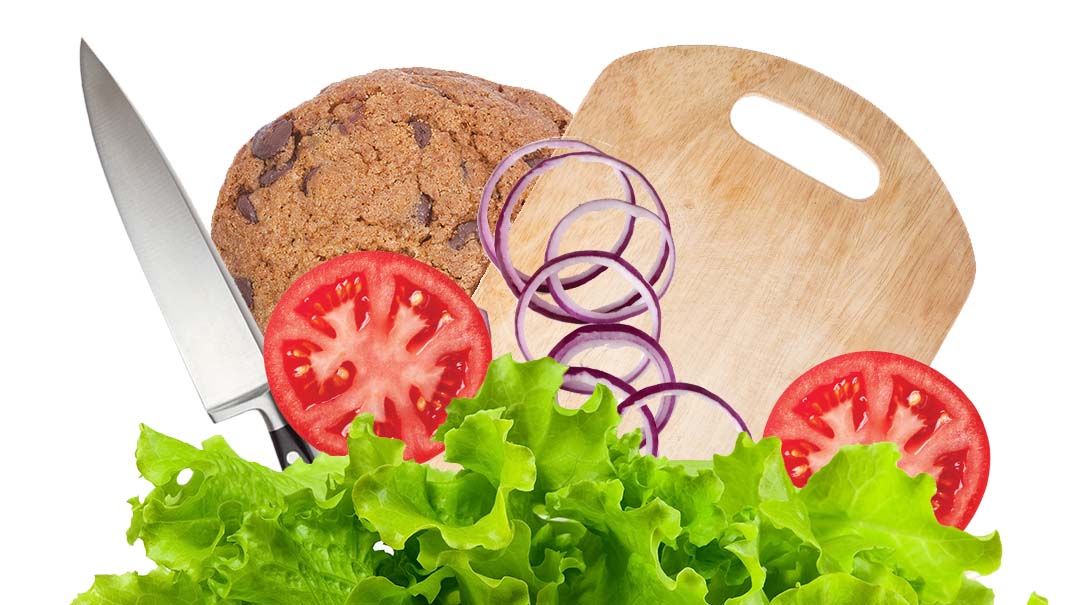What It’s Like to Be a Chef

Three seasoned professionals open up about what it’s like to feed the crowds from their kitchens

W hat’s on the menu? Every day is different which is why one morning might entail preparing roast rack of lamb with English mint sauce and watercress salad for a crowd of 80 while the next will have you painstakingly piping mini tzitzis onto 50 cookies only to finish off the week by churning out 20 pans of schnitzel. Three seasoned professionals open up about what it’s like to feed the crowds from their kitchens
Esther Mendelevich
31 is a personal chef at The Kosher Gourmet her home-based business in Brooklyn New York. She’s been working in the food industry for seven years.
People assume that when you’re cooking for a crowd you just multiply your favorite recipe by five or twenty. But it’s not that simple because
Dealing with a large crowd means you’re dealing with a bunch of different tastes, dietary restrictions, allergies, and so on. When I cook in my house, either you eat what’s served or you don’t, but when I’m cooking for a crowd, my job is to please every person in that crowd. If one person leaves unhappy with the food, then I’ve failed.
The two foods that are always finished first
Sushi and hors d’oeuvres. Everything made mini always goes; it’s amazing how much more people eat when it’s bite-sized. In terms of what men eat versus what women eat, I guess the stereotypical assumption is that men like the meat, while women eat the salads, but that’s not really true — women like their meat, and men like their salads, too. What I’ve noticed is that men like bigger bolder flavors, they prefer more spice, while women like things a little blander. Women also eat more desserts than the men — even though they pretend they don’t.
Three ingredients a good cook never runs out of
Number one has to be salt — it’s not just a spice, it’s a flavor enhancer, it makes all the flavors in the dish pop. My other ones are onion and garlic; there’s no dish, aside from dessert, that can’t benefit from some onions and garlic, whether they’re sautיed, roasted, or fresh.
My biggest flop, and what I served instead
I’ve definitely had a few. When it happens I have to eat — no pun intended — the cost. There was the time I burned a tray of chicken and had to make a lot more. Another time, I was cutting meat for an event and somehow the roast fell apart completely, so instead of having beautiful slices I ended up with shredded beef. But when life gives you pulled beef, you make pulled-beef tacos! And you know what? They were eaten faster than any sliced roast I’ve ever served.
The largest/most unusual meal I catered
Right out of culinary school, I thought it would be a good idea to cater my twin son’s and daughter’s upsheren/birthday party. I knew nothing about cooking for a large crowd or buying things wholesale, and I ended up spending triple what it would have cost to hire a caterer. Plus, I spent so many hours in the kitchen, I completely lost track — I can’t even tell you how many hours I put in for the event. Luckily for me, my inefficiency came into good use. I thought we were having 150 people, and I way overcooked for that amount — so I had more than enough for the 300 that showed up. But lesson learned! For my next son’s upsheren, I hired someone else to do it. Granted, the food wasn’t exactly how I would have liked it, but I got to actually enjoy the party instead of directing the waiters and making sure everything was refilled.
You enjoy cooking at home so you think you want to cook professionally. Just know that
A chef’s life isn’t as glamorous as it’s portrayed. Most of my job involves cooking in an over-100-degree kitchen for hours on end, late into the night. Clients can keep changing their minds, they’re unsure what they want, but they expect perfection. And events can occur at the most inconvenient times. I used to do this monthly Rosh Chodesh food demo for a shul in Staten Island, and it always came out on a night when a friend was visiting from out of town, or it was someone’s birthday, or it was the night my husband had to work late. A more realistic view of a chef’s life is this: me in my kitchen at 3 a.m., the thermostat at a comfortable 105 degrees, a pile of dishes the size of Mount Kilimanjaro waiting to be dealt with, and I’m mixing flavors, trying to figure out how to make some sort of gluten-free, dairy-free, sugar-free, oil-free, fruit-free dessert taste good.
Hadassa Bamberger,
40, is the cook at Yeshivas Toras Yisrael in Netivot. She’s been working in the food industry for 16 years.
People assume that when you’re cooking for a crowd you just multiply your favorite recipe by five or twenty. But it’s not that simple because
Actually, it is for me! Because I’m not that type that sticks to recipes, I just use them as a guideline. I don’t really open my recipe book. To be honest, I probably spend less time in the yeshivah kitchen cooking for 75 boys than I spend cooking at home. At the yeshivah, I don’t have to deal with the shopping or the cleanup, and I’m not making the boys fancy dishes, just basic good, filling food. So to make eight kilos of rice, I’ll fill jugs of water instead of cups of water and pour them into the huge pot. Not a big deal.
The two foods that are always finished first
Schnitzel, they always clean the plate till the end — and that’s a lot, because I make about 10 kilos (22 lbs) at a time. And potatoes, I make about 35 kilos (77 lbs). It’s bochurim, remember?
Three ingredients a good cook never runs out of
Salt and pepper, of course. Onions — chayavim lihyot — you can’t do anything without onions. And chicken-soup mix. I use it to flavor roasted potatoes, mashed potatoes, in the schnitzel crumbs, to flavor the vegetables for the couscous, and in a lot of other dishes. Boys sometimes bring me recipes from home to make. One boy gave me a recipe I make a lot now: sautיed breast of chicken with date honey, hot pepper, and chicken-soup mix.
My biggest flop, and what I served instead
One time I made a big pot of rice, but after it cooked I discovered it was infested with bugs. I made pasta instead — that’s quick and easy and it’s something the bochurim enjoy. When I was catering, I once catered a meal for Friday night and the meat got spoiled. Nothing I could do about it, I only found out from the waiters, and it was Shabbos — too late to make anything else. It’s a good thing there was a lot of chicken to go around!
The largest/most unusual meal I catered
Life in the yeshivah kitchen is pretty humdrum. Day after day, they want regular good, tasty food, they don’t want me to do anything different. It can become boring for me — that’s my challenge — but they don’t appreciate changes in the menu. The boys love the food, mothers call me for recipes all the time, and they tell me when their sons are home for Shabbos, they say, “But in yeshiva we have this-and-this.” I feel bad that those mothers have to hear that, but I’m happy the boys are eating well in yeshivah.
You enjoy cooking at home so you think you want to cook professionally. Just know that:
You need to be easygoing and flexible and able to work under pressure. And the schedule can be draining, the hours are long, particularly for a yeshivah kitchen: It’s day in, day out, no days off except for bein hazmanim. Physically, you’ve got to have the stamina to stand on your feet for a long time. And I think you have to be a happy person to make good food; just like any other job, you have to put your heart into it. If you’re happy about what you’re doing in the yeshivah kitchen — giving the boys good food so they should be able to learn well — you’ll make good nourishing food. And when the boys come to the kitchen to thank me, I find that I get more koach to stand on my feet for long hours.
Sharon Beck
42, is the owner of Kosher Private Chef, which offers private chef services and kosher concierge nationwide. She’s based in Miami, Florida, and has been working in the food industry for 25 years.
People assume that when you’re cooking for a crowd you just multiply your favorite recipe by five or twenty. But it’s not that simple because
When you multiply a recipe, it’s a physical and chemical process, and it can get tricky for large crowds. Yes, you can double, and possibly triple a recipe, but any more than that and complications usually arise. One tip — keep in mind that if you’re multiplying a recipe and baking desserts or breads in larger pans, you’ll need to increase your baking time, so watch the oven carefully.
Most of my business at this point is from my personal chef business, KosherPrivateChef.com. I have a team of culinary professionals all over the US, as well as chefs who are ready to travel internationally, and we get orders for everything from upscale everyday meals to gourmet travel meals — think meals for a family of six vacationing for a week in Turks and Caicos. We cater to discerning kosher clients worldwide, people hosting kosher yacht parties, destination weddings, mansion rentals, private dinners on the beach in Miami, and more.
The two foods that are always finished first
French fries and franks ’n blankets. People crave salty, fried foods — they’re not gourmet items, but they’re always a crowd favorite. These are the foods that no matter how much you make, it’s never enough.
Three ingredients a good cook never runs out of
Fresh garlic, onions, and high-quality olive oil. I love extra-virgin olive oil — EVOO — because a drizzle of great olive oil can immediately infuse a pop of flavor into a dish. And yes, there’s a fundamental difference between extra-virgin olive oil and other olive oils; in EVOO, the taste is much more concentrated, it’s much stronger. Additionally, because the oil is extracted from the olives via a cold process, it retains very high levels of nutrients without introducing chemicals. Not only does that have health benefits, but the process also lowers the oil’s acidity and produces a fresher oil that tastes better and lasts longer.
My biggest flop, and what I served instead
It was a delicate lemon meringue pie I made for a Friday night dessert at a bar mitzvah dinner. A few hours before Shabbos, I noticed the meringue had melted and dripped down the sides of the pan, due to the humidity in the kitchen. It tasted great, but it looked terrible, so I improvised — I decomposed the pies, and voila! Instead of pie, we made frozen lemon-mousse cups with graham cracker crumbs and whipped cream. It was a big hit.
The largest/most unusual meal I catered
I once did a meatless meat-themed meal, prepared from totally pareve ingredients. The menu was pepper “steak,” “chicken” with scallions and ginger, “veal” with wild mushrooms, and baby “lamb” with pesto. We used lots of soy products, seitan, and tofu. The biggest challenge was getting the textures and flavors to work, but everyone enjoyed the meal and couldn’t believe it was pareve.
You enjoy cooking at home so you think you want to cook professionally. Just know that
Professional cooking isn’t anything like making dinner for family at home. It’s exhausting, and very hard on the feet and back. At the same, it’s extremely rewarding — there’s nothing like the instant gratification from a happy satisfied client, and it’s an exciting industry to be in now because the kosher clientele has become more sophisticated than ever.
(Originally featured in Family First Issue 567)
Oops! We could not locate your form.












